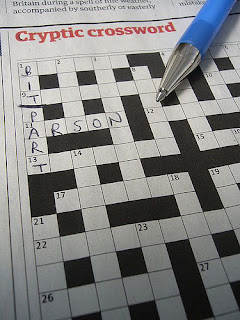 |
| Cryptic crossword, by Terry Freedman |
This type of crossword
relies on two things for its completion: a knowledge of synonyms, and
mind-reading. While it is true, as someone put it, that there are no synonyms
in English, there are certainly enough near-synonyms
to choose from when it comes to crosswords.
Take, for instance,
this clue:
Achieved (3)
What answer is the
compiler looking for? Won? Got? Did? Any of these is possible. Indeed, a
colleague told me in 1979 that a man he'd met in the pub the night before was
having trouble getting the very last clue of his (straight) crossword. It
transpired that the reason for the impasse was that, incredibly, answers to all
the other clues were wrong.
This could almost
certainly never happen with a cryptic crossword because each clue consists of
two parts rather than one: the definition of the answer, which is equivalent to
the clue in the quick crossword, and a secondary indicator which tells you how
to arrive at the answer. You just have to understand the strange mangling of
the English language that comprises the crossword code. As the compiler Afrit
put it:
"You need not
mean what you say, but you must say what you mean."
Let's take a few
examples. First:
Egyptian flower (4)
You might be
wondering, what kind of flower grows in Egypt? A Rose? An Iris? And in so doing
you would get precisely nowhere. But think of flower as rhyming with lower, you
realize it is something which flows, ie a river, and you deduce the answer
immediately: Nile.
Having mentioned the
word 'lower', perhaps we might try this:
A little lower on the farm (4)
If you start thinking in terms of height, you
may as well abandon all hope. Just as a flower in the first clue referred to
something that flows, so a lower in this clue refers to something that lows, ie
a cow or a bull. Clearly, a little lower
is a calf.
Before we leave this farm, consider this:
Farm
butter (4)
As you may have surmised, a butter in
'crosswordese' is something which butts – in this case a goat.
These are examples of the compiler deliberately
setting out to draw you into making a false assumption, from which point it is
all downhill unless and until you can step back and realise that is exactly
what you've done.
Other clues have more obvious indicators. For
example, "all over the place" or "disconcerted" would indicate
an anagram:
Such
an event would disconcert astronomers (2,4,5)
The word
"disconcerted" indicates that the answer is an anagram of
"astronomers". The answer is: No more stars.
Other indicators
include:
Detailed – meaning the
end of the word has been cut off ie de-tailed.
Beheaded – the first
letter of the word has been chopped off.
Midnight – that is,
the middle of the word "night", ie "g".
Finally, crossword
compilers have a great sense of humour. Some years ago the Daily Telegraph
crossword featured the following clue:
What an incompetent deep sea diver must do to
get rid of an irritation? (4,2,2,7)
(A question mark at
the end of the clue, by the way, indicates a mangling of the language that will
cause the solver to groan.)
The answer? Come up to
scratch.
Except, of course, solving the whole puzzle.